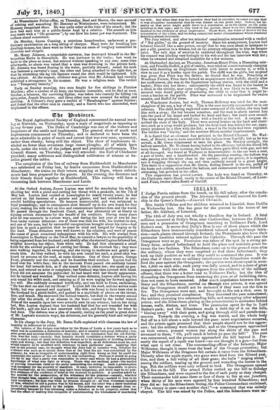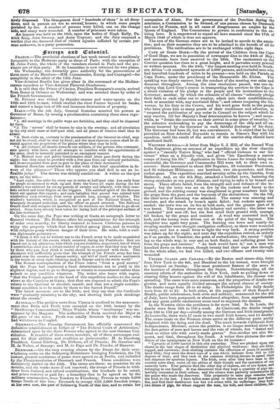IRELAND.
I"Judge Perrin retires from the bench, on his full salary, after the conclu- sion of the present circuit. The Attorney-General will succeed his Lord- ship in the Queen's Bench.—Limerick Chronicle.
Mrs. Smith O'Brien and her children returned to Limerick from Dublin on Wednesday last. She has gone for the present to the house of her father, Mr. Gabbatt, of Limerick.
The 12th of July was not wholly a bloodless day in Ireland. A fatal collision occurred at Dolly's Brae, near Castlewellan, between the Riband- men and a procession of Orangemen marching to Tollimore Park, Lord Roden's seat. It seems that Dolly's Brae is one of those places which the Ribandmen have immemorially considered tabooed against Orange intru- sion—such places abound through Ireland; the Protestants also have their particular localities tabooed against the Catholics. Through this pass the Orangemen were to go. Possession was taken of the spot by a strong mi- litary force, ordered beforehand to hold the place and maintain peace be- tween the two factions. The Ribandmen came on to the ground soon after the military, whom they were surprised to find there beforehand; they
took up their position as well as they could to command the pass. It was
plain that if there were no military interference the Ribandmen would de- fend the pass against the Orangemen; the parties were about equal in num- ber, 1,500 on each side; each party was fully armed, and in a state of great exasperation with the other. It appears from the evidence of the military officers, that there was a batter road to Tollimore Park; but the idea of dissuading the Orangemen from traversing the pass, or of forbidding them, does not seem to have occurred. After much negotiation between the mi- litary and the Ribandmen, carried on through two priests, it was agreed that the Orangemen should not be molested if they were not the first to fire. The Orangemen were met, and besought to fire not a shot, even in fun; and they promised compliance. They traversed the pass unmolested; the soldiers crowning two commanding hills, and occupying other adjacent
points; and the Ribandmen glaring at the processionists in ambushes behind houses, walls, ditches, and- trees. The procession spent its day in Lord ROden's park; and the Ribandmen made a field-day of it on the hills, "blazing away" with their guns, and going through drill and parade man- ceuvres. Towards the evening, a flag was waved, and the whole body fled off to a bill about a mile beyond the pass: more negotiations occurr
and the priests again promised that their people should not be the aggres- sors: but the military were distrustful; and as the Orangemen approached on their return, peasant women ran along the skirts of the pass and Screamed to them, " Oh, yell catch it before ye pass the hill!" The pass was retraversed, and the procession approached the hill beyond it. Pre- sently the report of a squib was heard—no one thought it a gun—but from what spot is not clear. The commanding-officer of the' Infantry, Major Wilkinson, thought it came from the head of the Orange procession; but
Major Wilkinson of the Dragoons felt certain it came from the Ribandmen. Directly after the squib report, two guns were fired from the Riband posi- tion, and then a full volley of all their guns; the balls " singing about " among the soldiers, tearing up the ground, and wounding the horses in the
legs. But the soldiers were only ordered to load. The Orangemen opened a full fire on the bill. The armed Police rushed up the hill to dislodge
the Ribandmen, and were exposed to the fire of each party as they charged. Their commander told some three or four of them to fire at one juncture, when thirty of his men were opposed; by four hundred Ribandmen; and they did so: but the Ribandmen fleeing, the Police Commandant exclaimed, " The victory it ours—not another shot! "—a command that was strictly obeyed. The hill was seized by the Police, ititd.the Ribauelons were en-
tirely dispersed. The Orangemen fired " hundreds of shots " in all direc- tions, and in pursuit set fire to several: houses; in which some people perished by fire. A number of persons were killed, one on the Orange side, and many were wounded. A number of prisoners were taken.
An inquest was held on the 16th, upon the bodies of Hugh Kelly, Pa- trick King, John Sweeny, and Anne Traynor; and the Jury returned a Verdict that the deceased died of violent injuries inflicted by certain per- t= unknown, in a party procession.



























 Previous page
Previous page